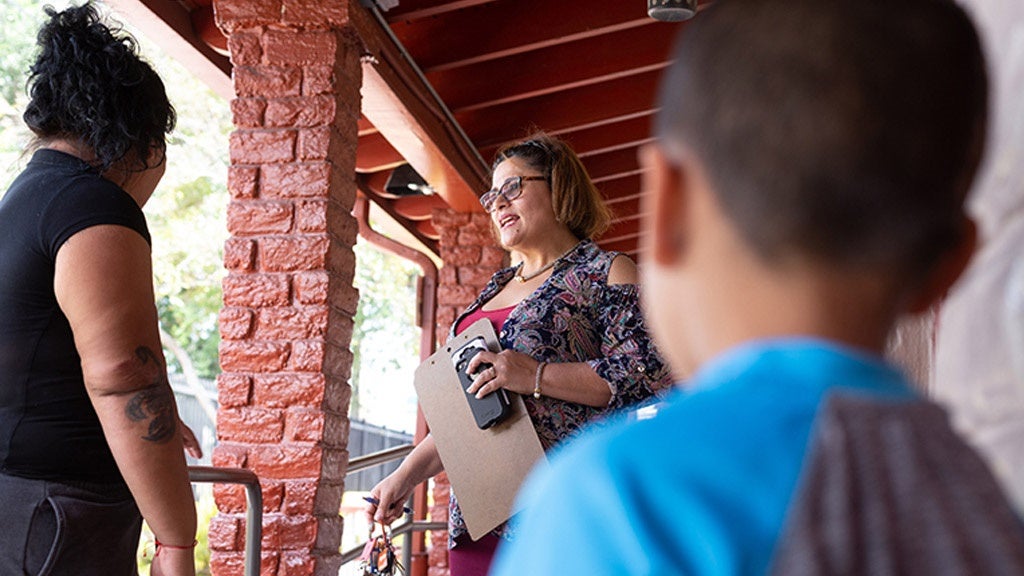

The COVID-19 global pandemic causing havoc across the U.S. poses a stark threat to homeless populations while an economic downturn may create a new wave of homelessness.
Those are some of the worries that several Catholic Charities staff in the Archdiocese of Miami expressed recently, as they sharpen their response plans to the spread of COVID-19.
As of March 20, the virus has claimed some 200 American lives and infected at least 15,000 in all 50 U.S. states, prompting a raft of growing restrictions and school closures from New York to California.
Until last week, Broward County had been reporting the highest number of confirmed coronavirus cases in the state, according to the Florida Department of Health. Miami-Dade surpassed that number as of March 22, reporting 227 cases to Broward’s 217. Statewide, 13 deaths have been associated with the virus.
“We do have hand sanitizer and we have a lot of soap and water and Lysol. The Catholic Charities agency as a whole has really been diligent about promoting personal hygiene,” said Evelyn Soto, regional director for New Life Family Center, a Catholic Charities-sponsored motel-style facility near Miami’s downtown.
At present, New Life is home for some 29 people who are taking refuge while they get back on their feet. Children and families are the central focus of New Life. They work with staff to move into independent living in rental properties.
“Luckily, we had a few move out just recently and we are preparing the rest of our clients by providing them information in writing about the virus and putting out a lot of soap to wash their hands,” Soto said.
“Not a lot of them are in their rooms — either they go elsewhere or to jobs; they are keeping distance from one another and they are understanding what is going on,” said Soto.
She worries, though, about the region’s chronic homeless. Although they are not part of New Life’s outreach, they are part of the fabric of downtown Miami.
Every day or so, Soto and her staff participate in online webinars and training with other community agencies working with the homeless. The Miami-Dade County Homeless Trust has ramped up efforts to protect both sheltered and unsheltered homeless populations and staff in the face of the COVID-19 threat.
The Homeless Trust reports that persons experiencing homelessness are among the community’s most vulnerable and may be at risk of COVID-19 infection. The agency has an extensive list of new recommendations for reducing the pandemic’s harm among South Florida’s homeless.
“Our preparations have to consider the fact that much of our population does not have a ‘home’ with which to self-quarantine, therefore, we have broader issues to consider. We will continue to work to ensure homeless households have access to shelter, care and food while doing all we can to mitigate the virus’ spread,” said Ronald L. Book, Trust chairman, in a recent statement.
Although the Miami region is well versed in hurricane recovery, a pandemic is new territory.
“For administrators this is a scary beast. We may have to make some hard decisions,” said Peter Routsis-Arroyo, CEO of Catholic Charities, who noted some alarming features of the pandemic, including the specter of agency staff or administrators possibly needing to quarantine for long periods of time.
To say nothing of the likelihood of some clients becoming ill. They will be encouraged to quarantine themselves from others in various ways from agency to agency.
In the Florida Keys, Patrice Schwermer, the Key West-based Catholic Charities program director for Monroe County, noted that although there is no known outbreak of COVID-19 in Key West — only one case has been reported so far — the town has declared a state of emergency and begun closing tourist attractions in anticipation of the virus spreading.
“I am particularly concerned for the vulnerable elderly and those who are compromised (health-wise),” Schwermer said.
“I think this moment is an opportunity for us faithful to not be fearful but to have love in our hearts and see how we can be of service to others,” she added. “Our Catholic social teaching has so much to say about what we are going through. This is about our common good, about solidarity and we are all in this today.”
Catholic Charities does have several housing units in Key West. Those residents are currently housed at an assisted living facility while waiting for completion of construction at a new St. Bede’s Village workforce development facility in Key West.
“Here in Monroe County the real concern now is the economic fallout: We are so heavily based on tourism and service economy that the fear of a hard economy and fear of losing jobs, of not being able to pay bills, is big here,” Schwermer said.
But she noted the willingness of local organizations and agencies to work together to protect the most vulnerable.
“I got the sense that each organization continues to work in their specialized area with an eye to how they can utilize their expertise and resources in this particular crisis,” Schwermer said.
Soto added that although it’s a stressful time, it is important to remain calm and avoid the temptation to panic.
“At this time when things are getting so scary for a lot of people, sometimes it is better to be still and wait and hope for the best,” she said.
[This article by Tom Tracy originally appeared on the website of the Archdiocese of Miami and is used with permission from the author.]








